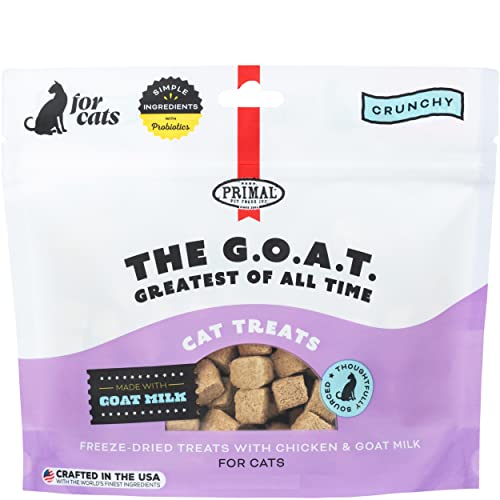Goat Feeding Schedule
A goat feeding schedule is a great way to set up a routine for your herd. Being consistent with food and water is not only helpful for you, it’s also helpful for your goats. They will learn the times that you come out and wait for you to arrive.
There is nothing quite as fun as a greeting committee of friendly goats waiting to say hello. Another great tip on how to raise dairy goats that are healthy, calm, well-behaved, and thriving.
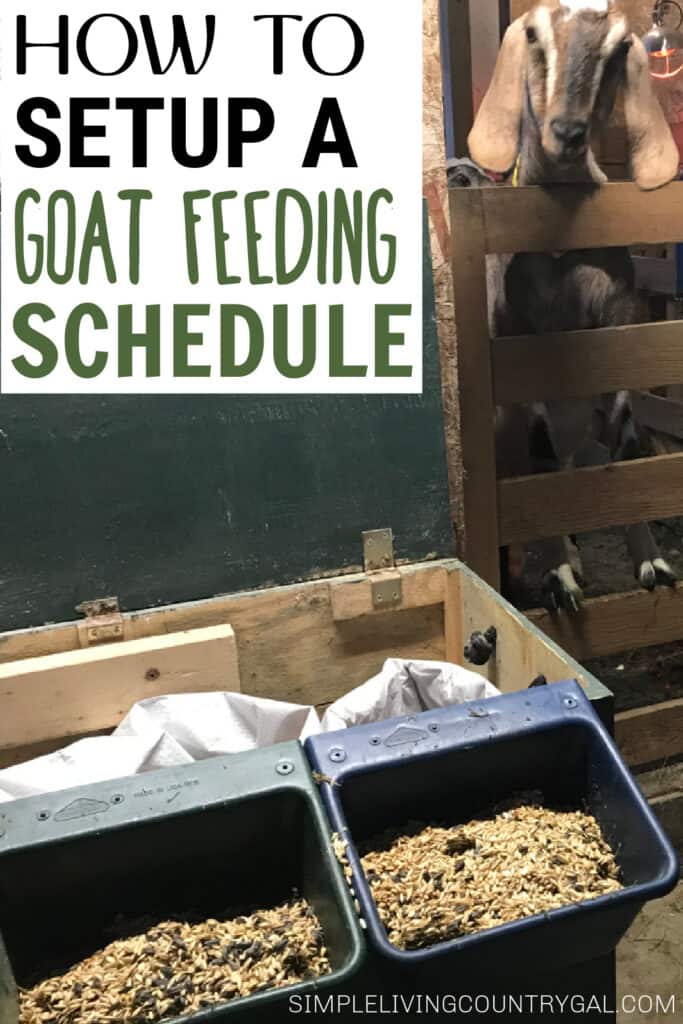
There is a lot that needs to be done on a homestead, and that is why routines can be so helpful. This is even more important if you raise animals. Since they depend on you for food and water, being consistent will keep everyone relaxed and free of stress.
When you set up a daily goat feeding schedule, it will help you to relax knowing you are giving daily care to your animals, helping them to thrive year round. A schedule is also important if you need to leave for a day or two because you can pass on your routine to your helper, making it easy for them to follow in your steps.
Why do you need a fixed feeding schedule for your goats?
Goats are creatures of habit and tend to do better when they are on routine. Just like people, routines can be beneficial to your health and well-being. For goats, a consistent feeding schedule will help reduce stress and anxiety, which will give you a healthier herd. It will also aid in better digestion, as goats’ bodies become accustomed to processing feed at certain times.
A feeding schedule can help make your goats people-friendly. The more you are with them, the more they become accustomed to you, helping them relax around people in general.
Finally, if you raise dairy goats, feeding consistently can keep milk production consistent as well.
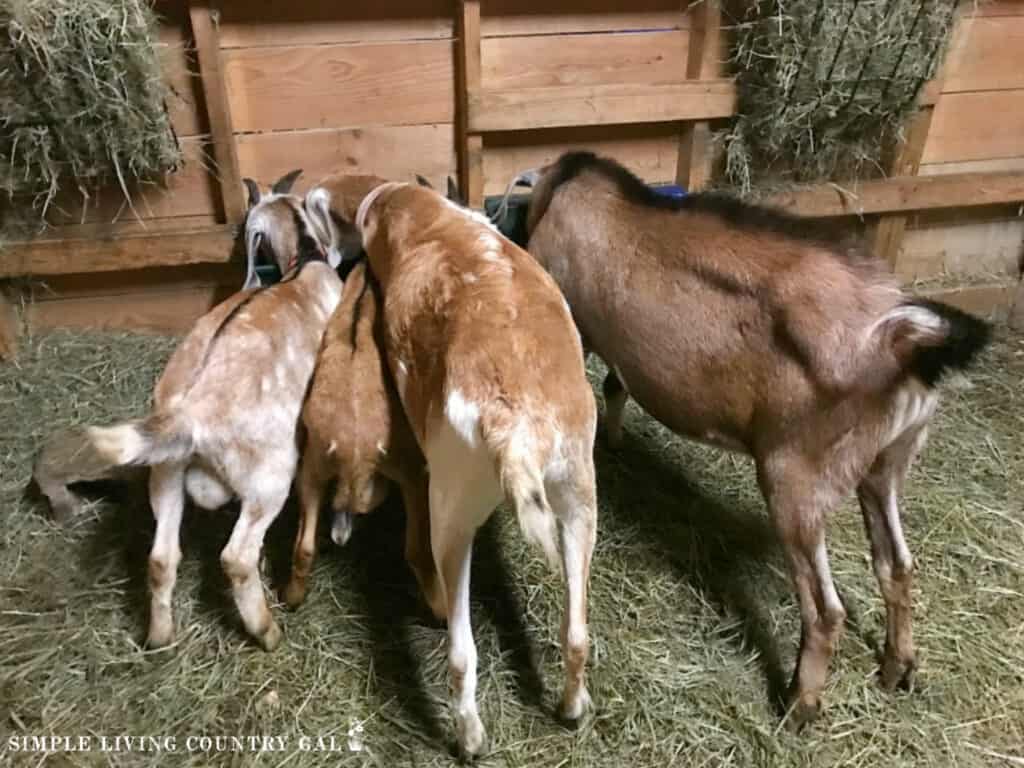
Types of food needed by dairy goats
Dairy goats need a diet that is high in energy, protein, vitamins, and minerals. This can be achieved through a balanced diet of grasses, hay, grains, and supplements such as free-choice minerals. It is also important to ensure that your goats have access to clean water at all times as well.
The nutritional content of different foods
Different types of food provide different nutritional benefits for goats.
- Grasses and hay are high in fiber, which aids in digestion and keeps the rumen functioning properly.
- Grains such as oats or barley provide energy for your goats.
- Supplements like minerals can help meet any deficiencies in their diet.
It is important to research and consult with a veterinarian or your county extension office to see what your soil may be deficient in. This will better help you to customize a feeding routine that meets any needs they may be lacking in your pasture or purchased local hay.
Disclaimer: In accordance with FDA guidelines, the information and products offered on this website are not intended to diagnose, treat, cure, or prevent any disease. I am not a medical professional. Before administering any medications to your animals please contact a veterinarian first.
Primal Freeze Dried Chicken Cat Treats, Made with Goat Milk The Goat Treats for Cats, 2 oz



Creating a Feeding Schedule
This is a good starting point for creating a feeding schedule for your goats. Remember to customize it to fit the breeds you raise as well as the ages and stages of life your goats are in. This may mean a different feed will be needed for certain goats. If this is the case for you, be sure to keep records of any special diets.
Do goats need to be fed grain?
Grain is not essential for goats if they have access to good-quality pasture and hay. This is especially true for wethers, and I actually recommend not feeding grain to castrated males unless instructed to do so by your vet. Grain can cause crystals to form and possibly block the urethra, a deadly condition called Urinary Calculi. To prevent this condition, only feed hay or pasture to your wethers
However, grain can be beneficial in certain situations, such as pregnant does, underweight goats, and young kids that are growing rapidly.
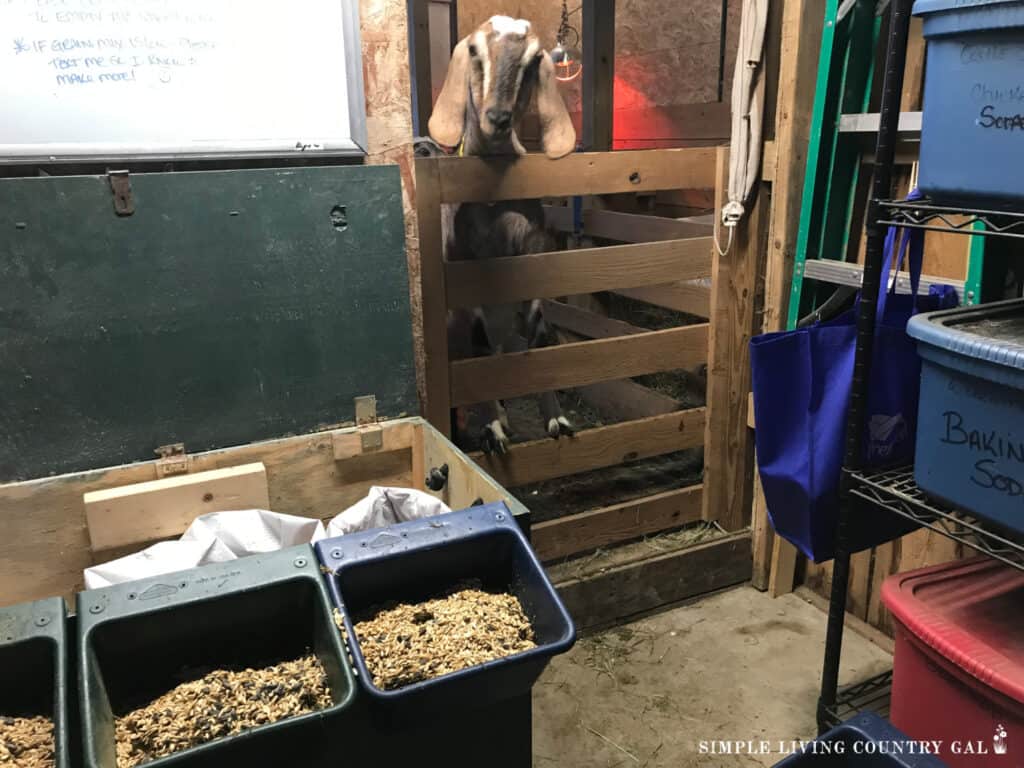
Determining the right quantity of feed
Feeding your goats the right amount is important for their health and well-being. A good rule of thumb is to feed about 3-4% of a goat’s body weight in dry matter per day. This means that if you have a goat that weighs around 100 pounds, they should be consuming around 3-4 pounds of pasture or hay daily. However, it is important to note that this is just an estimate and may not apply to all goats.
Age and Weight
When creating a feeding schedule for your goats, it is important to factor in their age, weight, and lactation. For example, pregnant or lactating does will have different nutritional needs compared to dry does or young kids.
How often to feed goats
As a general rule, dairy goats should be fed twice a day – once in the morning and once in the evening. It is important to maintain a consistent feeding schedule to prevent digestive issues.
Storey’s Guide to Raising Dairy Goats, 4th Edition: Breeds, Care, Dairying, Marketing

Example of a feeding routine.
This is how we feed our goat herd. I like to go out once in the morning and again the early evening.
- Change out water – Goats prefer fresh water and water is the secret to any healthy living being.
- Give fresh hay – In the off-season, we supplement with hay. I like to put fresh hay in each feeder to ensure everyone has enough to eat.
- Grain – For any goats that are on grain, we pull them out to feed on leads. This is called tethered feeding, and it was a trick I learned years ago. It is really helpful to feed this way, especially if you have goats on special diets. You can read more on tethered feeding here.
- Minerals – Once everyone is done eating and back in their communal pen, I will replenish any minerals, kelp, or backing soda as needed. We offer these free choices, allowing our goats to individually decide what they need for their nutrition.
- Worming – We use herbal wormers and dose them 1-2 times each week. I usually do my dosing before feeding to ensure everyone eats and swallows.
I really like to have a routine because it helps me to know I am not forgetting any steps with our goat’s care.
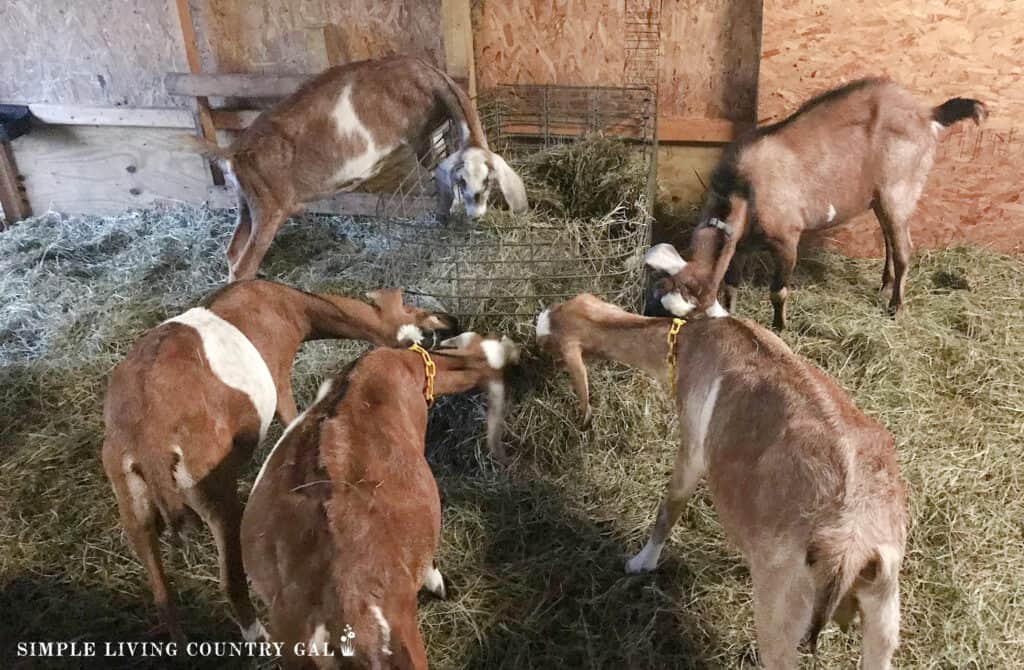
Seasonal Adjustments
Let’s take a look at a few things to consider when feeding goats in different seasons.
Winter:
During the winter months, goats require more food to generate enough body heat to stay warm. We increase our hay rations during this time and also make sure they have access to plenty of clean water. To help our goats drink enough water, I will add black strap molasses once a week to their water buckets. Goats LOVE sweets, and just a few tablespoons is all you need to get everyone drinking.
If we have any goats that have less than optimal body condition, I will increase their grain starting in early fall. This will help them put on additional weight, giving them better protection in the winter.
Summer:
In the summer, when pastures are full of fresh grass and browse, we decrease our hay and grain feeds accordingly. For us, we tend to feed less grain to our goats in the summer unless they are being milked or are young kids.
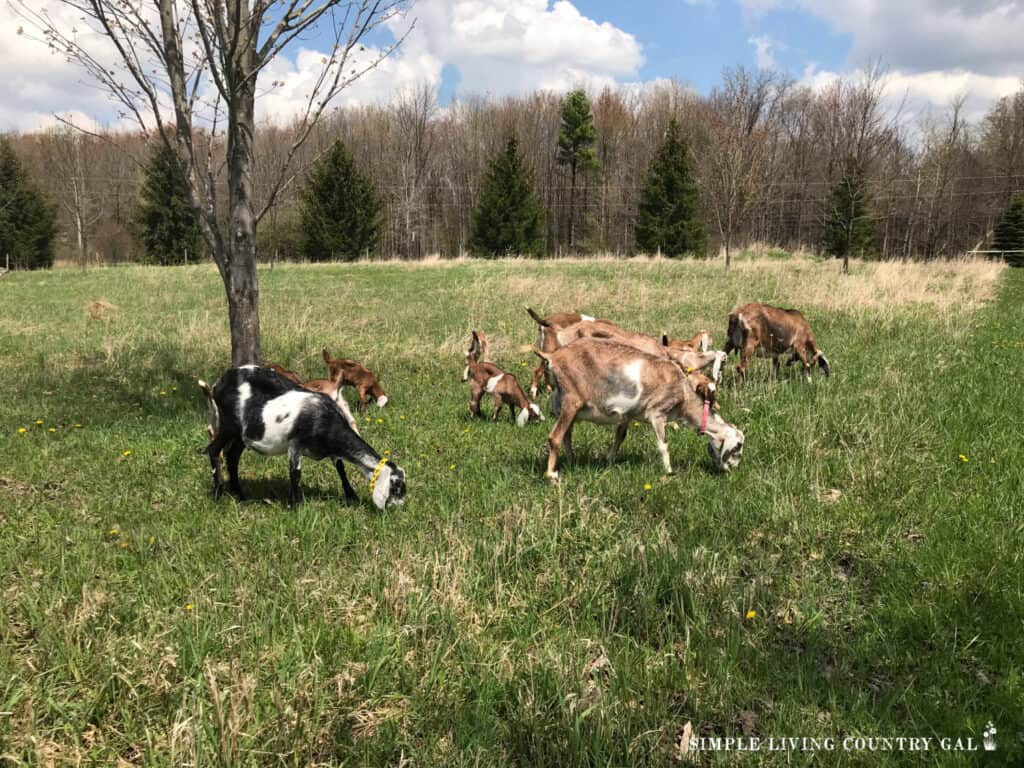
We also make sure to provide plenty of shade and fresh water for our goats to stay cool in the hot summer months.
To help encourage goats to drink enough in the summer, once a week, we add a splash of apple cider vinegar with the mother. Goats love the taste of ACV, and adding a few tablespoons to each water bucket is usually enough to get everyone drinking.
Fall and Spring:
These months tend to be very wet and muddy, and that can mean a risk of worm infestations with your goats. We increase worming doses to twice a week to ensure our herd is resilient enough to withstand any parasites. If you chemically worm, you may want to do a dose in the fall and the spring for the same reason.
Other Feed Adjustments to Consider
Besides the weather, there are other conditions that may require a different feed for different goats.
Feeding Pregnant and Milking Goats
Pregnant and nursing goats have increased nutritional needs, so their feed should be adjusted accordingly. They will require more protein, energy, and minerals to support the growth and development of their offspring. It’s important to monitor the body condition of your pregnant and nursing goats closely and adjust their feed as needed to maintain a healthy pregnancy and produce strong, healthy kids.
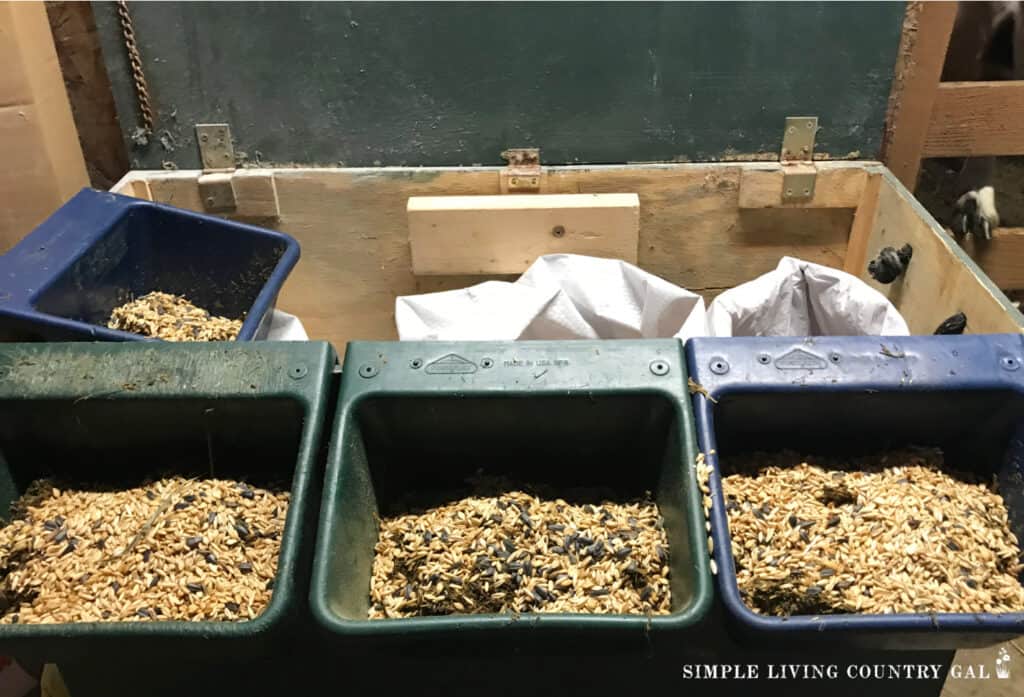
Feeding Young Kids
Kids, especially newborns, have very specific nutritional needs. They need a higher protein and energy diet to support their rapid growth and development. A quality kid milk replacer or dam-raised milk should be the main source of nutrition for kids until they are weaned. Once they are weaned, you can gradually introduce them to solid feeds like hay and grain. It’s important to avoid overfeeding kids, as this can lead to health issues such as bloat and diarrhea.
Feeding Senior Goats
As goats age, their nutritional needs change. Senior goats may require a diet that is lower in protein and energy but higher in fiber and minerals to support their aging bodies. They may also have dental issues that make it difficult for them to eat hay, so offering alternative sources of fiber, such as soaked beet pulp or alfalfa cubes, can be beneficial.
Monitoring Goat Health
To be sure your goats are on the right feed and schedule watch their health for signs.
Signs of a Healthy Goat
- Bright, alert demeanor
- Good body condition and weight
- Smooth and shiny hair coat
- Normal rumen function (rumen movements, cud chewing)
- Regular bowel movements
- Active and social behavior
Signs of a Unhealthy Goat
- Lethargy or depression
- Loss of appetite or weight loss
- Dull, rough, or patchy hair coat
- Diarrhea or constipation
- Abnormal rumen function (bloat, lack of cud-chewing)
If you notice any of these signs in your goats, it’s important to consult with a veterinarian to identify the cause so you can give the best support and care. Regular check-ups and vaccinations are also important for maintaining goat health and preventing diseases.
Proper nutrition is essential for maintaining the health and well-being of your goats at all stages of life. Understanding their nutritional needs and providing a balanced diet will ensure that your goats live long and healthy lives. Remember to monitor their health regularly and consult with a veterinarian if any issues come up that are concerning. With a proper goat feeding schedule, you can raise a herd of healthy, happy, milk-producing goats on your homestead.

